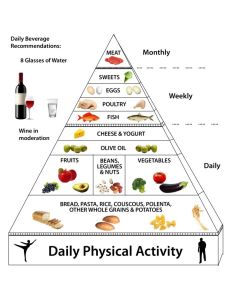Recent studies have accumulated in more recent years, suggesting that our eating habits are affected by our life-style and geographical location. Due to this, there has been a current decline in the general health and well being of our population in the UK.
“Diet”. A word that is accompanied with a sigh, associated with “to-good-too-be-true” health benefits and arranged around food deprivation and miraculous weight loss. And so, diet after diet is tried and tested. But is there one cuisine that could do all this for you without the empty plate?
The Mediterranean diet.
So what do we know about the Mediterranean diet (MD)? The diet copies traditional eating habits of those living in countries that boarder the Mediterranean Sea. Countries that follow the nutritional regime include Spain, Greece and Italy. Due to this there are no exact foods that are included in the diet; instead key constituents are the same if not similar. Figure 1 (featured at the end of the post) shows the basics of the diet, highlighting the foods eaten most often towards the lower portion of the food triangle. Foods such as legumes, whole grains and fresh fruits and vegetables are a large part of the diet. There does not seem to be a large amount of fats eaten, however consumption of olive oil is an important factor of the diet.
Now that we have basic facts about the diet, we can start to understand why the foods eaten (especially in quantities depicted by figure 1) are so beneficial to our health.
An iconic study directed by American scientist Ancel Keys took a deeper look into the correlation between diet and cardiovascular disease (CVD). The twelve year study started in 1958 and gathered information from 13,000 men from seven different countries. The findings helped shed light on a diet where little nutritional information was already known. Key found that there were very low rates of CVD in Mediterranean countries. This has since prompted further research into the diet and its effects on the heart. Due to low levels of saturated fats being consumed, the diet is especially gentle on the heart.
So, whilst the MD is well known for its contribution in reducing high rates of cardiovascular disease, there have also been links to certain cancer-protective properties in the regime. It is thought that there are lower instances of cancer in Mediterranean countries due to the fresh food eaten. Essential vitamins found in the daily diet are called antioxidants, such as vitamin A, C, E and selenium (readily available from oily fish and omega fatty acids). These antioxidants help prevent damage to cells caused by free radicals. This can help prevent medical complications like cancers in the body.
The evidence above makes it pretty clear that the Mediterranean diet is possibly one of the best nutritional choices to make. Research has shown how the diet incorporates essential vitamins and minerals in foods that are easily attainable in the UK, without removing food groups from your day to day diet and depriving your body from food. This shows how easily a “diet” can become a healthy lifestyle choice.
References!!
Spiller, Gene A. , 1991, ‘The Mediterranean diets in health and disease’, 1st edition, Van Nostrand Reinhold, New York
Matalas, Antonia-Leda. , Zampelas, Antonis. , Stavrinos, Vassilis. , Wolinsky, Ira. , 2001, ‘The Mediterranean diet: constituents and health promotion’, 1st edition, CRC Press, Florida
Mediterranean Life, 2013, ‘The Mediterranean food pyramid’, [online] [accessed 30th October 2013] http://www.mediterranean-life.net/the-mediterranean-food-pyramid/
Moravej, H. , 2013, ‘Nutrition 21: The Mediterranean Diet’ Manchester, Manchester Metropolitan University, 21 page presentation, distributed on 17. 10. 2013

Reblogged this on B Healthy.